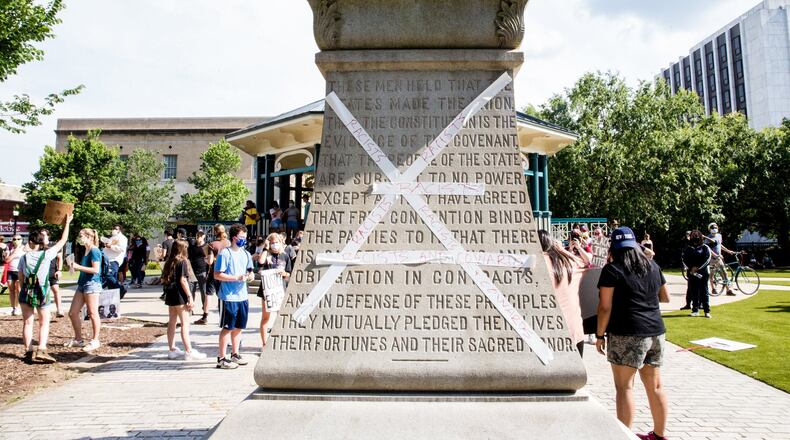On Sunday, ministers of more than a dozen predominately-white Decatur-area congregations will read a pastoral letter of “confession” for the church’s failure to address systemic racism in the city.
The letter begins “unequivocally” with the words “Black Lives Matter,” said the Rev. David Jordan, senior pastor of First Baptist Church of Decatur.
“It’s basically a confession of white clergy that our churches have been racist, participated in racism and is part of systemic racism,” he said.
Some of the ministers, whose churches represent a cross-section of denominations, read the letter last week, most will read it on Sunday.
At First Baptist, the letter has already been published on the church’s social media sites and in its newsletter.
Many of the churches have worked on social and racial justice issues.
The decision to read the letter comes as protests against police killings of African Americans, racism and societal inequities continue in many U.S. cities, including Atlanta.
“Too many of our Decatur churches were planted in soil tainted with racism,” the letter states. “Too many of our Decatur churches harvested the fruit of that racism. And like too many of our predecessors, we who now serve as your shepherds have been too silent, too complicit in those systems because they benefit us. As the prophet Jeremiah writes, “[We] have treated the wound of [God’s] people carelessly, saying, ‘Peace, peace,’ when there is no peace.”
Some black pastors have criticized their white colleagues for not doing more to address racism from their pulpits.
In a recent interview, the Rev. Timothy McDonald III, senior pastor of First Iconium Baptist Church on Moreland Avenue in Atlanta, voiced his frustration at what he called the "silence of the white church."
The letter acknowledges that point.
“The recent murders of Ahmaud Arbery, Breonna Taylor, and George Floyd force us to see what our fellow black clergy have long told us: that systemic racism is not only embedded in our city, our state, and our nation, it is also embedded in our churches and in us, your clergy.”
In Minneapolis, Floyd, who was handcuffed by police, died after police officer Derek Chauvin pressed his knee on Floyd’s neck for 8 minutes and 46 seconds. In Louisville, Kentucky, Taylor, who was asleep in her apartment, was shot eight times by police who were serving a no-knock warrant.
And in the Brunswick, Georgia area, an unarmed black jogger, Ahmaud Arbery, was shot and killed after two white men stopped him as he ran through a neighborhood.
Many churches have stepped up to address the deep divisions in the metro area. This week, for example, Catholics and United Methodists in metro Atlanta marched through downtown.
The Rev. Sara Robb-Scott, associate pastor at Scott Boulevard Baptist Church and a member of the ministerial staff at First Baptist Decatur writes a blog that deals with social issues and issues of faith.
“I believe it is a testament to my faith and an action that I can take as a person of faith to stand in solidarity with people who are hurting,” she said. “And right now, that’s the black community.”
Jordan said he has not received any pushback from members, though “there may be some tomorrow at the end of the service.”
Credit: Christina Matacotta
Credit: Christina Matacotta
The entire ministry staff will read the letter before the benediction.
It will be followed by a taped Zoom video interview between Jordan and former Black Panther Randall Hampton, who is also a member of his church; and Decatur Police Chief Mike Booker.
First Baptist has 500 active members, about 20 percent of whom are African American.
Many of the members he’s heard from have been “very appreciative. Many said it was long overdue and we should have done this years ago,” the pastor said.
He said the churches want to be allies in the struggle.
There have been protests in downtown Decatur, and on Friday, a DeKalb County judge ordered that a Confederate monument, a 30-foot obelisk, in the Decatur square should be immediately relocated.
Judge Clarence Seeliger says the monument should be placed in storage until further notice. It calls for removal to take place by midnight on June 26.
About the Author
Keep Reading
The Latest
Featured




